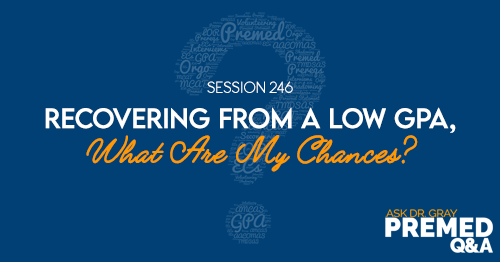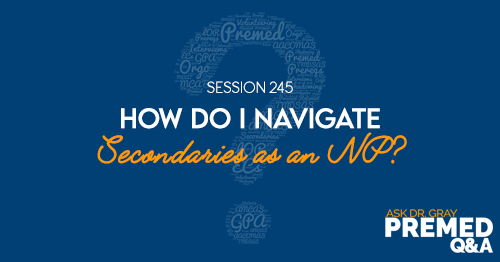Apple Podcasts | Google Podcasts
Session 229
This student had an okay score on the MCAT, but it wasn’t amazing. They want to know if retaking could hurt their chances.
Ask Dr. Gray: Premed Q&A is brought to you by Blueprint MCAT. Listen to this podcast episode with the player above, or keep reading for the highlights and takeaway points.
The episodes in this podcast are recordings of our Facebook Live that we do at 3 pm Eastern on most weekdays. Check out our Facebook page and like the page to be notified. Also, listen to our other podcasts on MedEd Media. If you have any questions, call me at 617-410-6747.
[00:27] Question of the Day
“I just finished my spring semester for my master’s program. I’m here, I went to Pitt for undergrad. And I’m doing my biomedical master’s program here and that was for the year and I’m in a summer class right now. Now, I’ll be graduating officially in August. I decided to go that route because the undergrad GPA just wasn’t there. And I definitely wanted to take like a pretty heavy science course load and guess prove myself through this.
But my biggest issue has always been with the MCAT. I took it recently this year, in April for the third time, and still just cannot seem to hit the score that I want to hit breaking that 510. I got a 506. I was just thinking that that is a good area to fall into to be a competitive applicant. I know that you can have a range with every school. I mean, it’s a good increase from my last exam, which was a lot was a lot worse – a 501. So it’s a good jump, that’s one part I’m happy about. But it was very defeating because I studied for it full-time while as a student. Also, while doing research just had a lot going on. But I dedicated a lot to it this time, and my practice full-lengths were all well above 510. So I think when I sit down on test day, I don’t know what happens, but it’s obviously not what I expected.”
I’m 100% still wanting to apply this cycle. I finished with a 4.0 in both semesters. So I did really well in my master’s program. I’m doing research here at the Vascular Medicine Institute and looking to get hired full-time for the next year. I have these experiences under my belt.
I have the grades now with this master’s, hopefully making up for undergrad. Does that “fix” that undergrad GPA of doing well in a program like this?
As a retake, is this going to be worth it for the cycle of the MCAT? Because, of course, if I score lower, if I have another slip-up, that’s terrible. If I don’t score any higher, that doesn’t make a difference. And I just don’t want my applications to be delayed. Because I’ve read on a lot of school websites that, hey, if you’re expecting a future score to come in, we’re not going to review your applications until all that comes in.”
[04:21] Whether to Retake the MCAT or Not
At least you’re at a 506 and not a 496. There’s a drastic change there. You improved over your second score, which was a 501. So you went up five points, which is great. Still disappointing from where you want it to be and that sucks. Now, you have two options.
Look at two options.
Option one is just press forward and do as well as you can do with your essays and your interview, prep and cross your fingers you get an interview invite. Option two is you sit down and re-study for the MCAT and take it again. But the question there is what are you going to do differently?
At the end of the day, what are you going to do differently that the last several months of what you said full-time prep didn’t let you do? Or is it not necessarily the prep and more kind of a psychological aspect of maybe you need some testing anxiety help?
Look at the test anxiety aspect.
As students continue to take more tests, the pressure and anxiety build up, creating a daunting monster in their minds. The belief that each test is a make-or-break situation becomes overwhelming, even though there are multiple opportunities to retake the test. Unfortunately, the stress and test anxiety tend to increase with each attempt, hindering performance.
Seeking help from psychiatrists or psychologists specializing in test anxiety could be a valuable option for those struggling. However, it requires a readiness to address and work through these challenges before being prepared to face the test again.
'The stress just increases every single test, it doesn't get better.'Click To TweetMake a gut decision.
Ultimately, this is just a risk-benefit equation. The longer that you wait to take the MCAT, the worse your chances are. Especially with these rolling admission schools, they are reviewing applications on a first come first serve. They’re going to sit on your application because you have a pending MCAT score, and that will hurt you.
Good thing you have other stuff in your application that could potentially help you stand out in other ways. And all of that stuff that goes into an application. At the end of the day, you just have to make a gut decision of whether you should apply or not.
[08:46] How Schools Look at Your Master’s Degree
Unfortunately, you just don’t know how schools take your master’s into account. There are schools out there that will forgive you for your undergraduate GPA and really judge you based on your master’s GPA. The frustrating part is you just don’t know what schools will do that. And so, you just have to make this estimated gamble, put your heart and soul out there, and apply to schools where you think you’re going to be a great fit.
Ultimately, do you want to put in the time, money, and effort to apply, knowing that your application is on the weaker side in terms of stats? And that can be frustrating because there are so many other factors that go into this. But that’s a big part of this process. Number one, you have to prove you’re academically capable.
[11:16] Is It Worth a Shot to Retake?
Q: “Going into this third retake, I felt very confident in my knowledge. I really don’t think it was a gap in my studying. I can confidently say that. The night before though, having taken this twice, I think I had a little bit of trauma with this experience, to be honest, because of just taking it twice, and not getting a good score. That was always ingrained in my brain. And even the night before this third retake, I got maybe two hours of sleep because I couldn’t get to sleep. And so, it is more of a testing anxiety situation that holds me back.
Even in just a few weeks, the schools can be looking at thousands more applications. Is it worth putting myself delaying myself more even for a “no guarantee” of a better score? If I were to go and say, let me give this one more shot, would you say do this as soon as possible?”
A: Again, it’s risk-benefit. Taking the MCAT sooner has its benefits, such as receiving scores and completing applications earlier, leading to quicker reviews by medical schools. However, there is a risk of not being adequately prepared, which may reflect poor judgment in medical schools. The question arises: Why rush into taking the test if the outcome remains the same?
When I first applied to medical school, I faced the disappointment of rejection. I was in a similar situation, albeit more naive about the application process. Despite having good grades as an undergraduate, my MCAT score was not strong, equivalent to a 502 today. I also lacked significant clinical experience and shadowing. Surprisingly, I still managed to secure two interviews.
When I received rejections from both schools, it felt like a personal attack, as if I was being told I couldn’t become a doctor. In reality, they were simply pointing out areas that needed improvement. I took their feedback to heart, asked the right questions, and worked on those aspects. Ultimately, I was accepted into medical school the second time around.
[17:46] Living Your Dream as You Go
One of the common misconceptions about pursuing a career in medicine is the idea that we sacrifice our 20s for the sake of our profession. However, this notion is flawed. Medical students are still living their lives and making important decisions, even though their paths may differ from others who are getting married, starting families, or buying homes.
Life still goes on.
It’s essential to recognize that every day spent working towards becoming a physician and caring for patients is a part of the journey and should be seen as a success. The dreams of aspiring medical students are not being delayed; they are simply living their dreams each day, adjusting and embracing the process as needed.
“We are living life while we're going through medical school.”Click To TweetAge is often a significant concern for individuals starting medical school, questioning whether their lives would have significantly differed if they began at a slightly younger age. However, in the grand scheme of things, starting medical school at 24 instead of 25 may not have a substantial impact on one’s life. Reflecting on the past, it may seem inconsequential whether an extra year was spent before beginning medical school.
Perspective plays a role.
The perspective changes with time and experience. What may have felt like a significant delay when considering a fraction of one’s life in the present becomes less significant when looking back after several decades. The age difference, though noticeable at a younger age, does not hold as much weight in the long run. It’s important to remember that perspective plays a crucial role in understanding the significance of these types of decisions.
[22:23] What Makes a Strong Application
Q: “I am 100% ready to apply this cycle and I’ve gotten everything ready. With this master’s underway, I did take a lot of heavy science courses. I’m confident about my experiences, like clinically shadowing, volunteer-wise. And then now with this research under my belt, would you say that’s still a relatively strong application, in spite of this MCAT setback?”
A: There will be admissions committees out there that don’t care that you got a 4.0 on your master’s program. And so, whether your application is strong is subjective to the medical schools.
'A strong application is completely subjective to the admissions committee reviewing it.'Click To TweetThe student having a GPA of 3.39 is not horrible. Your master’s can’t hurt you. The question will be, will it help you at all of the schools that you’re applying to? The answer is probably not, but you won’t know.
[24:20] Building Your School List
Q: “Do I look at schools keeping this graduate GPA in mind? Or do I still keep the undergrad GPA in mind? Or do I combine them?”
A: Check out How to Build the Ultimate Med School List on The Premed Years Podcast. If you were to look at the MSAR, it doesn’t include graduate stuff.
If you were to look at the MSAR, it doesn’t include graduate stuff. How are you supposed to make decisions using the MSAR when you don’t fit into that mold? When using stats to apply to med school, your final number they’re showing there doesn’t have any story behind it. It doesn’t have trends. And so, you’re 3.39 could have an incredible upward trend. It just happens to be master’s level courses. Or it could be a 3.39, with a terrible downward trend. And that tells a completely different story.
“Med schools aren't making decisions based on that final number. They may be filtering based on that final number. But they're not making decisions based on that final number.”Click To TweetUltimately, your 3.39 probably will get you through most filters. Then they’re going to look at everything a little bit more closely and see what’s going on. And then again, the question is, are they going to use your master’s or not to help sway one decision in terms of your academic ability? But we just don’t know.
[26:47] Final Thoughts
When it comes to the medical school application process, it’s important to focus on the aspects that are within your control. You may not know all the rules of the game, but that shouldn’t discourage you. Instead, concentrate on what you can do: continue performing well in your master’s program and put effort into crafting compelling essays that reflect your story.
“You don't know the rules of the game… so don't try to play the game.”Click To TweetSubmitting your application in a timely manner is also crucial. Take the time to write thoughtful responses to secondary applications and prepare for interviews to the best of your ability. By focusing on these areas, you can maximize your chances of success. Remember, you have control over your own actions and how well you present yourself throughout the application journey.
Ultimately, if you got a 515 versus a 506, that’s a huge difference to your application. The question is, can you do that? Now, if you delay your application, and you only get a 508 compared to a 506? Does that really help? That’s the equation you have to work out.
Moreover, you can still update your application if you initially indicate that you will send a future score but later decide to cancel it. Admissions committees understand that plans can change, and they are usually open to receiving updated information. Just make sure to communicate any changes or updates to the admissions office in a timely manner.
Links:
Medical School HQ Facebook page
Medical School HQ YouTube channel
Instagram @MedicalSchoolHQ
Join the Application Academy!
The Premed Playbook: Guide to the Medical School Personal Statement
The Premed Playbook: Guide to the Medical School Application Process
SEARCH SITE
LISTEN FOR FREE












